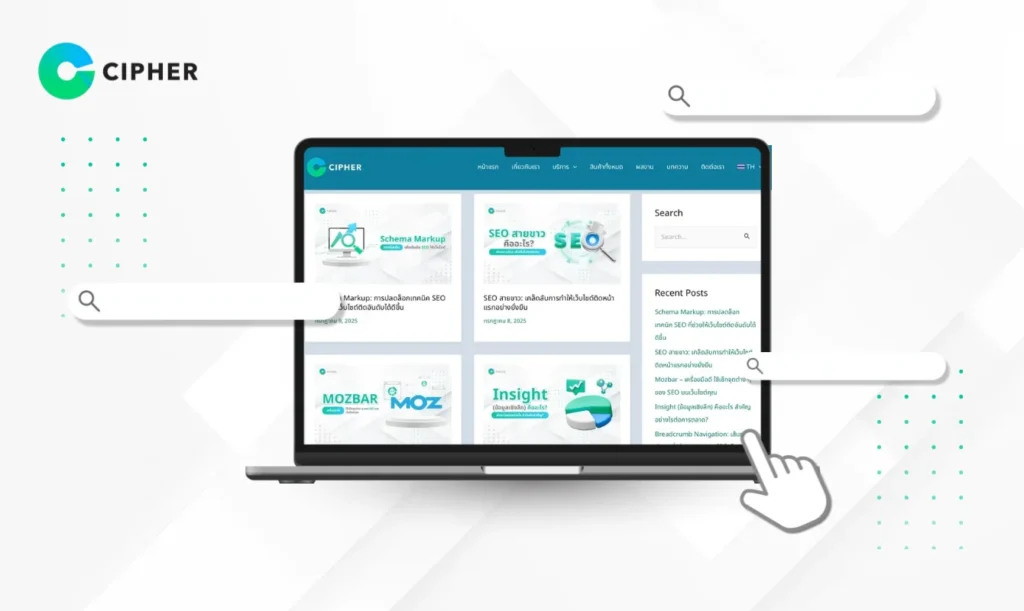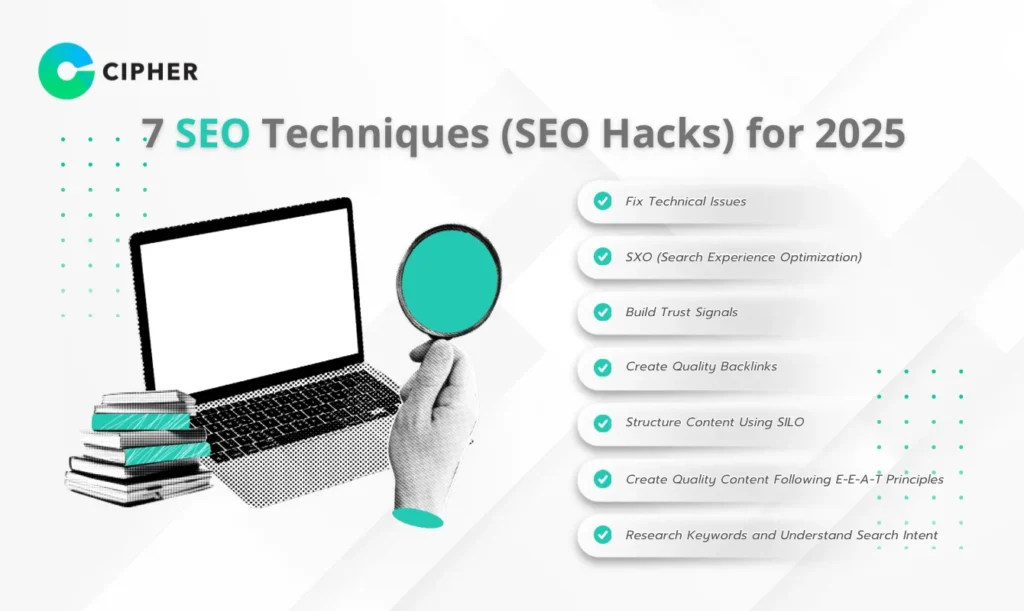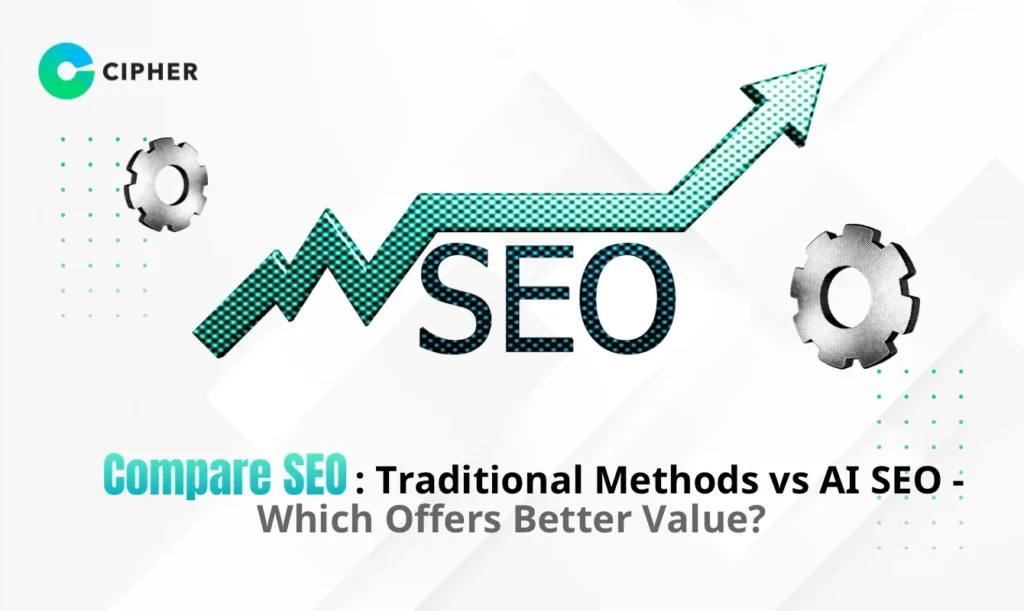In today’s fast-paced and highly competitive digital world, making your website stand out in search results is a challenge that many businesses face. When you compare SEO approaches, you’ll find that modern techniques are no longer limited to keyword stuffing and link building, especially as AI SEO technology revolutionizes the industry in unprecedented ways. A thorough comparison of SEO analysis between traditional methods and AI-powered approaches is essential for businesses looking to grow in the digital age.
Recent statistics show that 68% of online purchases begin with a search, but only 0.78% of users click on results on Google’s second page. This highlights why comparing SEO strategies is crucial for businesses of all sizes to determine the most effective approach.
This article will dive deep into a comprehensive compare SEO analysis between traditional methods and modern AI SEO techniques, helping you decide which offers better value for your business.
Table of Contents
Traditional SEO: The Foundation That Never Dies
What is SEO?

SEO stands for Search Engine Optimization, the process of optimizing websites to rank higher in search engines, particularly Google, which currently holds over 90% of market share. SEO fundamentals involve improving a website’s content, structure, and external factors to appear in the best possible position on search engine results pages (SERPs). When we compare SEO methodologies from traditional to modern approaches, we see that the fundamental principles remain unchanged despite technological advancements.
Key Components of Traditional SEO
Traditional SEO consists of three main components that deserve equal attention:
- On-Page SEO: Optimizing Within Your Website
- Optimizing Title Tags and Meta Descriptions
- Using Header Tags (H1, H2, H3) appropriately
- Adding Alt Text to images
- Creating SEO-friendly URLs
- Producing quality content relevant to keywords
- Implementing effective Internal Linking
- Off-Page SEO: Building External Credibility
- Creating quality Backlinks from reputable websites
- Implementing Social Media Marketing to increase awareness
- Generating Brand Mentions across platforms
- Guest Posting on relevant websites
- Building and managing Online Reputation
- Technical SEO: Technical Optimization
- Improved page loading speed
- Making websites Mobile-Friendly
- Using SSL Certificate (HTTPS)
- Creating and improving XML Sitemaps
- Configuring Robots.txt correctly
- Resolving Crawl Errors
- Enhancing Core Web Vitals
Advantages of Traditional SEO
Traditional SEO offers several advantages that make it a crucial foundation for online marketing:
- High Credibility: Human-created content typically has more depth and better understanding of cultural context
- Creativity: Humans can think outside the box and create more unique content than AI
- Strategic Decision-Making: Humans can flexibly adapt strategies to changing situations
- Emotional Understanding: Humans better understand readers’ emotions and feelings, creating more engaging content
Limitations of Traditional SEO
Despite its many advantages, traditional SEO has important limitations when compared to newer technologies:
- Time-Consuming: Keyword analysis, content creation, and tracking results require significant time and labor.
- High Costs: Hiring SEO experts or content teams is expensive.
- Limited Data Processing: Humans cannot process large amounts of data as quickly as AI.
- Slow Adaptation: Adjusting strategies to changing algorithms may be delayed.
AI SEO: Transforming Digital Marketing
What is AI SEO?
AI SEO refers to using artificial intelligence to optimize websites and content for search engine rankings. AI-powered tools can analyze vast amounts of data, learn user behaviors, and adjust SEO strategies quickly and accurately. AI SEO is completely changing how we approach optimization, making it essential to compare SEO traditional methods with these advanced techniques.
How AI is Used in SEO
AI SEO can help in many aspects of SEO:
- Keyword Analysis and Research
- Predictive keyword analysis through user behavior analysis
- Finding semantically related keywords
- Analyzing competitors’ keywords to find market gaps
- Content Creation and Optimization
- Creating content that matches search intent
- Updating existing content to match current trends
- Analyzing content performance and providing improvement recommendations
- Website Analysis and Optimization
- Checking technical issues like broken links or duplicate content
- Analyzing user behavior and recommending UX improvements
- Monitoring website performance and optimizing based on analysis results
- Link Building and Backlink Analysis
- Analyzing backlink quality and identifying harmful links
- Finding high-quality link-building opportunities
- Examining competitors’ link profiles and replicating successful strategies
Advantages of AI SEO
AI SEO has several advantages that make it a powerful tool in SEO:
- Time and Money Savings: AI can efficiently perform repetitive tasks without constant supervision.
- Detailed Personal Preference Analysis: AI analyzes user behavior in detail and accurately, allowing strategies to be tailored to each target group.
- Systematic Work: AI works systematically, from data collection to analysis and categorization.
- Processing Massive Data: AI can analyze large volumes of data much faster than humans.
- Quick Adaptation: AI can learn from algorithm changes and adjust strategies rapidly.
Limitations of AI SEO
Despite high efficiency, AI SEO has some limitations:
- Lacks Creativity: AI still can’t create content with the same emotional depth as humans.
- Algorithm Flaws: AI may make mistakes from learning incorrect or biased data.
- Lacks Cultural Context Understanding: AI may not understand certain cultural nuances or contexts.
- Requires Human Verification: AI-generated content still needs human review and adjustment.
SEO for Different Target Audiences: Personas to Consider
1. Executive Seeker
Characteristics and Behavior:
- Senior executives seeking quick, concise, and relevant information
- Often search with questions about ROI and business efficiency
- Limited time, requiring clear answers quickly
Appropriate SEO Strategy:
- Create content focusing on Executive Summaries
- Use AI SEO to analyze keywords related to business efficiency and results
- Present information in easy-to-understand graphs, charts, or numbers
- Emphasize “why” more than “how” to show the big picture and benefits
2. Marketing Professional
Characteristics and Behavior:
- Marketing experts seeking in-depth information and practical strategies
- Often searching for new techniques, tools, and marketing methods
- Interested in latest trends and success stories
Appropriate SEO Strategy:
- Create detailed How-to guides and Case Studies
- Use specific marketing keywords related to techniques and strategies
- Add Schema Markup related to tutorial articles and technical information
- Use AI SEO to analyze popular marketing questions and create answering content
3. Small Business Owner
Characteristics and Behavior:
- Entrepreneurs with limited resources but seeking valuable results
- Often searching for cost-saving methods and self-implemented sales increases
- Interested in easy-to-understand explanations and DIY methods
Appropriate SEO Strategy:
- Create content emphasizing value and return on investment
- Use keywords related to starting, saving, and DIY approaches
- Focus on DIY articles and immediately applicable tips
- Clearly compare different SEO approaches showing which suits small businesses
4. Technical Specialist
Characteristics and Behavior:
- Web developers or technical experts seeking in-depth information
- Often search using specific terminology and need detailed, accurate information
- Interested in code, settings, and technical troubleshooting
Appropriate SEO Strategy:
- Create detailed technical content with code examples and problem solutions
- Use specific technical keywords and terminology experts use
- Use AI SEO to analyze common technical problems and create content solving them
- Add Schema Markup for technical articles and user guides
5. Beginner
Characteristics and Behavior:
- Those just starting to learn about SEO and digital marketing
- Often search with basic questions and need easy-to-understand explanations
- Need step-by-step guidance and explanations of specific terms
Appropriate SEO Strategy:
- Create basic, easy-to-understand content with illustrations and terminology explanations
- Use keywords related to “basics,” “getting started,” “for beginners”
- Create detailed step-by-step guides
- Compare SEO approaches in simple, easy-to-understand formats focusing on overview rather than details
Tailoring your SEO strategy to each persona will help your content better resonate with target audiences. Whether using traditional SEO or AI SEO, appropriately combining both approaches will help you reach diverse target groups effectively.
The Search World Transformed by AI
User Search Behavior in the AI Era
User behavior has also changed:
- More Natural Conversations: Users type longer, more natural sentence queries instead of short keywords
- Expecting Quick, Relevant Answers: Users expect immediate answers without clicking through multiple websites
- Seeking Reliable Information: Despite wanting speed, users still want accurate information from trustworthy sources
Google AI Overview: New Challenges for SEO
ASEO: New SEO Approach in the AI Era
What is ASEO and Why It Matters
ASEO or Adaptive Search Engine Optimization is a new SEO concept focusing on rapid adaptation to changing technology and user behavior, with three key components:
- Discovery: Making Your Website Easier to Find
- Improve website structure to be easily understood by Googlebot and AI
- Use Schema Markup to provide clear information to search engines
- Create content that directly addresses Search Intent
- Engagement: Creating User Engagement
- Design attractive UX/UI
- Create valuable content that encourages sharing
- Use Personalization techniques to provide appropriate experiences for each user
- Results: Becoming a True Expert
- Continuously develop expertise in your industry
- Create content demonstrating thought leadership
- Build and maintain credibility through reviews, endorsements, and case studies
Compare SEO: Traditional Methods vs AI SEO - Which Offers Better Value?
Time and Resources
- Traditional SEO: Time-consuming, requires significant human labor, and has high long-term costs
- AI SEO: Saves time, works 24/7, and reduces long-term labor costs
Content Quality
- Traditional SEO: Content created by humans has more depth, emotional understanding, and creativity.
- AI SEO: Content may lack emotional depth but can be created quickly and cover topics more broadly.
Data Analysis
- Traditional SEO: Humans have limitations in processing large data volumes and may have biases in analysis.
- AI SEO: AI can analyze massive data quickly and accurately.
Adaptability
- Traditional SEO: Adapts more slowly to algorithm changes.
- AI SEO: Can learn and adapt quickly to algorithm changes.
Overall Value
In conclusion, when we compare SEO traditional approaches with AI SEO techniques, we find that the most valuable strategy combines both methods by using:
- AI SEO for repetitive tasks, data analysis, and performance monitoring
- Human expertise for creating valuable content, strategy planning, and quality control
7 SEO Techniques (SEO Hacks) for 2025

For your business to compete in 2025, here are techniques to implement:
- Fix Technical Issues: Improve Core Web Vitals, fix Crawl Errors, use HTTPS, and design websites for Mobile-First Indexing.
- SXO (Search Experience Optimization): Improve user experience with easy-to-use UX/UI design, increase page loading speed, and create smooth Customer Journeys.
- Build Trust Signals: Create Brand Mentions on credible platforms, encourage customer reviews, and engage in online communities.
- Create Quality Backlinks: Focus on quality over quantity, use Digital PR techniques, and create valuable content to attract Natural Backlinks.
- Structure Content Using SILO: Group related content together, create strong Internal Linking, and build Topic Clusters.
- Create Quality Content Following E-E-A-T Principles: Emphasize real expertise and experience, use reliable information, and regularly update old content.
- Research Keywords and Understand Search Intent: Use AI to analyze keyword trends, understand search intent, and use Long-tail Keywords.
SEO Services Tailored to Your Business
At Cipher, we believe in combining team expertise with AI technology to deliver SEO services that meet your business needs:





